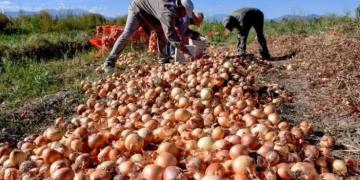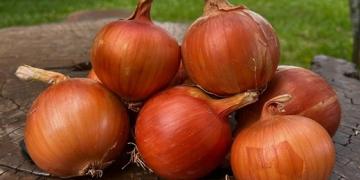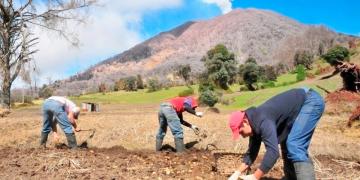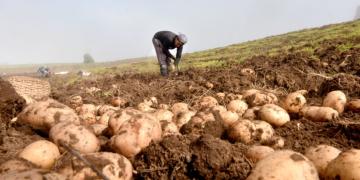Argentina: "An average potato producer with 100 hectares lost around US$640,000 this year."
“It’s really sad”: Why do they let potatoes rot in the fields?

An oversupply in the domestic market and the abrupt drop in prices caused many producers to let their potatoes rot in the field. The value of an 18-kilo bag went from $3,000 last year to $1,500 in 2025, an amount that doesn’t cover production costs. Investment per hectare last season was between $7,500 and $8,000, which covers barely 20% of the investment. The organization that represents producers estimated that an average farmer with 100 hectares lost around $640,000 this year and anticipated a reduction in the planted area for the next season. Ezequiel Martínez, a producer advisor in southeastern Buenos Aires, noted that this past season saw an oversupply in the market. "There was no price and there were no buyers because there was an excess of potatoes on the market," he noted. Several producers left plots unharvested because "they didn’t have enough." One hectare can yield about 3,000 bags, which at the previous price represented nearly $9 million, but at today’s prices, the business has fallen to around $4.5 million.
Production costs range between US$7,500 and US$8,000 per hectare.He pointed out that this price isn’t good for anyone. Not the producer or the industry. "Only the greengrocer, who doesn’t spend a penny," he summed up. In the countryside, a large 18-kilo bag of potatoes costs 1,500-1,600 pesos, while in greengrocers, a small 2- or 3-kilo bag costs the same.
There are two major potato markets in the country: the home market, which travels from the fields to grocery stores and supermarkets, and the industrial market, which is purchased by processing companies to make industrial potato chips. However, this year, contracts are not being fulfilled either, due to a clause imposed on producers: "They only buy 50 or 60% and they don’t release the rest," said Martínez. Since industrial potatoes are not suitable for consumption, the surplus has begun to be sold informally on roadsides under the label "for potato chips."
Adding to the market problems were adverse weather conditions, such as excessive rainfall, which "caused the potatoes to begin to rot underground." In many cases, the harvest was only partial or the crop was abandoned altogether. From an agronomic standpoint, Martínez explained that the potatoes left in the soil decompose and release nutrients, although "the large amount of remaining potatoes complicates crop rotation," as producers must wait for sprouting and apply herbicides before planting, for example, sunflowers.
Producers are not harvesting potatoes from the fields due to high costs.Alfredo Pereyra, president of the National Federation of Potato Producers (Fenapp), stated that "a lot of potatoes are still being harvested, but the loss is enormous." He explained that, in addition to what is directly considered lost, "not even 20% of the investment has been recovered."
To illustrate the situation, he indicated that an average producer with 100 hectares dedicated to the market will lose around $640,000 this year. "If you invest about $8,000 per hectare, that’s $800,000 in total, and if you only recover 20%, the loss is around $640,000," he calculated.
Meanwhile, Mario Raiteri, a potato producer, secretary of Coninagro, and vice president of Fenapp, warned that he will "reduce the planting area for this campaign because the economic equation is poor, and the financial equation, with rates of 60 to 80%, is impossible to sustain."
Rateri said he had to leave 10% of the land unharvested, although some producers abandoned between 30 and 50% of their plots, waiting for an improvement in prices that never came. "Many hoped that some areas would fail so the price would recover, but that didn’t happen," he noted.
This is how the potato is lying in the fieldThe oversupply stemmed from widespread good harvests and a decline in domestic demand. “Today, potatoes are worth almost 50% less than last year. But those with money don’t just eat two more kilos, and those without jobs simply don’t buy them,” he explained. He added: “The Argentine cost is very high, and the exchange rate was uncompetitive for almost the entire harvest.”
Raiteri emphasized that the economic and climatic situation has led to severe losses and the abandonment of plots in various producing regions, including Buenos Aires, Córdoba, Tucumán, Mendoza, Río Negro, Santa Fe, Catamarca, and Jujuy. In total, the country maintains a stable area of between 90,000 and 100,000 hectares, with yields of 35 to 70 tons per hectare, depending on the region. The province of Buenos Aires accounts for nearly 50% of national production.
Producers and advisors predict that, given this scenario, the planted area will be reduced for the next season. "The area will decrease because burying money like this isn’t worth it," said Martínez. He also warned that the reduced supply could lead to a further price increase, but in the next season, in a repeated cycle of overproduction and shortages.
The solution, they agreed, is for Argentina to develop an export line to balance the market and avoid further oversupply crises. However, fresh potatoes are difficult to sell abroad because "80% of the product is water, and freight is charged on water." On the other hand, frozen pre-fried potatoes and seed potatoes—which offer greater added value and technological know-how—do find foreign markets, especially in Southeast Asia and Europe.
“Knowing that there’s food left in the fields, while there are people who can’t eat, is truly sad. Many smaller producers won’t be able to plant again and will simply disappear. Potatoes are the third most important food source in the world, after wheat and rice. It’s not just a business: it’s food. And seeing it left in the fields, unable to harvest it, is the most painful thing of all,” Raiteri summarized.
Fuente: La Nación




